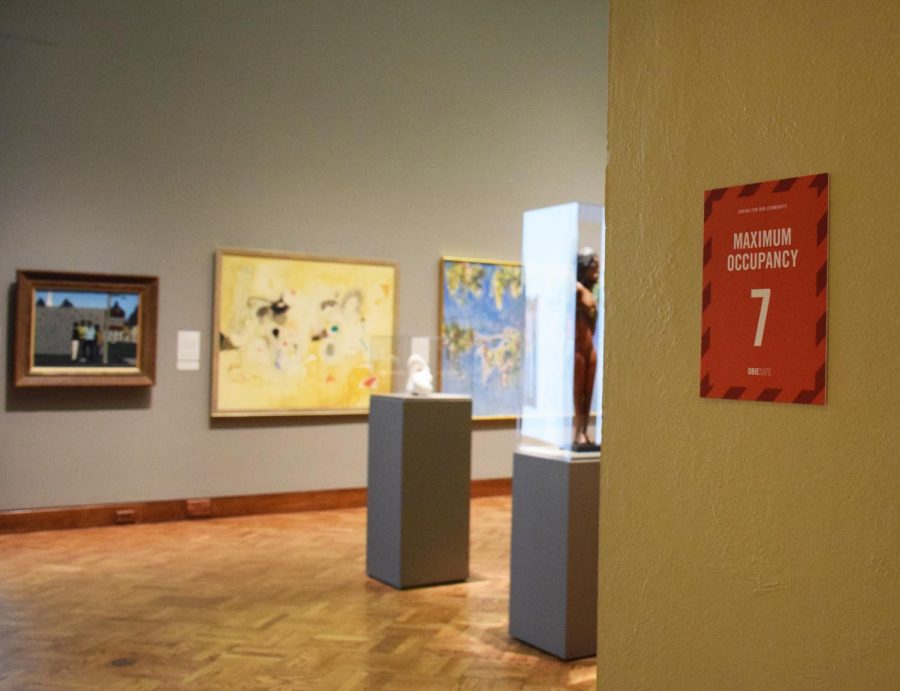COVID-19 Brings Challenges, Opportunities for AMAM
The new maximum occupancy of the AMAM’s Stern Gallery is only seven people due to pandemic safety concerns.
This year, the Allen Memorial Art Museum has restricted access to Oberlin College ID-holders. However, some of the changes brought on by COVID-19 have given the AMAM’s staff the time to work on virtual initiatives and programs which increase museum accessibility beyond the College.
Since students were sent home in March, AMAM curators and leadership pivoted to online outreach and worked to innovate the museum’s role in a socially-distant world.
This past June, the AMAM created a Spotify playlist inspired by the themes and art of the recent Afterlives of the Black Atlantic exhibition, which was curated by Ellen Johnson ’33 Assistant Curator of Modern and Contemporary Art Andrea Gyorody and Assistant Professor of Art History Matthew Rarey. They collaborated with Associate Professor of Africana Studies Charles Peterson and Associate Professor of Africana Studies and Comparative American Studies Meredith Gadsby on the project. The group also hosted a webinar in celebration of Juneteenth to talk about the songs and their relevance to the moment.
“It was neat that we were able to have some exhibitions, have a little bit of a longer lifespan because of technology, and … to involve the community in new ways,” said John G. W. Cowles Director of the AMAM Andria Derstine. “I don’t think [this] would have happened without COVID giving us the thought and the chance and the time to think about other ways of working.”
The sudden change from in-person visits and tours meant that Jill Greenwood, the Eric & Jane Nord family curator of education, had to adapt the museum for virtual-access. With public schools operating online, there has been greater flexibility in how and when students can experience the AMAM’s collection.
“In working with schools or with anyone in the community who is interested in taking a tour, the museum is closed prior to 10 a.m.,” Greenwood said. “That was difficult for teachers in middle school through high school because they would have five classes throughout the day, two of them prior to 10 o’clock. They can’t let three of their classes go on a museum tour and not offer it to the other two classes. Now, there’s no problem. We can do Zoom sessions all day long to meet K–12 educators’ needs.”
The Education Department has also taken the limited touring schedule as an opportunity to focus on ongoing accessibility initiatives. The department is currently developing an OnCell app to replace the museum’s audio guides. The OnCell app will provide history and visual descriptions of art pieces to increase accessibility for people with visual impairments.
Hannah Kinney, assistant curator of academic programs, has also been engaged in creating a hybrid experience for students in the museum. Student visits to the Allen before COVID-19 often centered around the Print Study Room, where one can view artworks closely and in person. When COVID-19 initially shut down the museum, Kinney had to reassess the meaning of the museum experience and the necessity of being physically close to art.
“Museum-based teaching is this idea that when you look at a work of art together, it’s like a conversation,” said Kinney. “One person’s observations build off of another’s, and so somebody might see something totally different than you see, or bring a bunch of background to that work that you don’t have. And so it’s great to build off of each other’s comments.”
Kinney used a mix of Zoom and Prezi to recreate the experience of close looking and discussion online. The technologies added to students’ experience with objects because they enabled them to zoom in on high-resolution photographs of art, allowing them to observe details that they would not normally be able to see.
Kinney also ran an internship program this summer focusing on community engagement. Eight Oberlin College student interns developed the Objects of Value project, in which members of the Oberlin community are invited to share everyday objects that they find personally valuable. The objects are then posted on the museum’s Instagram page to encourage people to think about valuable objects of their own. You can find this series under @allenartmuseum on Instagram.
As of Aug. 25, the museum has opened by-appointment visits for OCID holders who are in the COVID-19 testing program at the College. The museum will return to limited regular hours by Sept. 8 for OCID holders.










